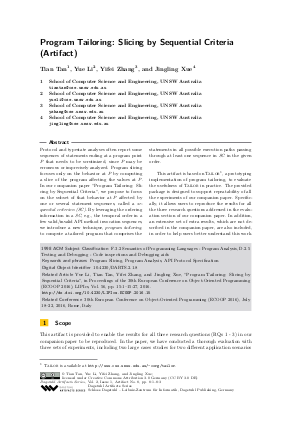Program Tailoring: Slicing by Sequential Criteria (Artifact)
Authors Tian Tan, Yue Li, Yifei Zhang, Jingling Xue
-
Part of:
Issue:
Special Issue of the 30th European Conference on Object-Oriented Programming (ECOOP 2016)
Part of: Volume: DARTS, Volume 2 (ECOOP 2016)
Part of: Conference: European Conference on Object-Oriented Programming (ECOOP)
Part of: Journal: Dagstuhl Artifacts Series (DARTS) - License:
 Creative Commons Attribution 3.0 Germany license
Creative Commons Attribution 3.0 Germany license
- Publication Date: 2016-07-14
Artifact Description

PDF
DARTS.2.1.8.pdf
- Filesize: 435 kB
- 3 pages
Document Identifiers
Subject Classification
Keywords
- Program Slicing
- Program Analysis
- API Protocol Specification
Metrics
- Access Statistics
-
Total Accesses (updated on a weekly basis)
0Document
0Metadata
Artifact
DARTS-2-1-8-artifact-e6fccf02cf279d8a7a4c442919aca52f.tgz
(Filesize: 0.55 GB)
MD5 Sum:
e6fccf02cf279d8a7a4c442919aca52f
(Get MD5 Sum)
Abstract
Protocol and typestate analyses often report some sequences of statements ending at a program point P that needs to be scrutinized, since P may be erroneous or imprecisely analyzed. Program slicing focuses only on the behavior at P by computing a slice of the program affecting the values at P. In our companion paper "Program Tailoring: Slicing by Sequential Criteria", we propose to focus on the subset of that behavior at P affected by one or several statement sequences, called a sequential criterion (SC). By leveraging the ordering information in a SC, e.g., the temporal order in a few valid/invalid API method invocation sequences, we introduce a new technique, program tailoring, to compute a tailored program that comprises the statements in all possible execution paths passing through at least one sequence in SC in the given order. This artifact is based on TAILOR, a prototyping implementation of program tailoring, to evaluate the usefulness of TAILOR in practice. The provided package is designed to support repeatability of all the experiments of our companion paper. Specifically, it allows users to reproduce the results for all the three research questions addressed in the evaluation section of our companion paper. In addition, an extensive set of extra results, which are not described in the companion paper, are also included, in order to help users better understand this work.
Cite As Get BibTex
Tian Tan, Yue Li, Yifei Zhang, and Jingling Xue. Program Tailoring: Slicing by Sequential Criteria (Artifact). In Special Issue of the 30th European Conference on Object-Oriented Programming (ECOOP 2016). Dagstuhl Artifacts Series (DARTS), Volume 2, Issue 1, pp. 8:1-8:3, Schloss Dagstuhl – Leibniz-Zentrum für Informatik (2016)
https://doi.org/10.4230/DARTS.2.1.8
BibTex
@Article{tan_et_al:DARTS.2.1.8,
author = {Tan, Tian and Li, Yue and Zhang, Yifei and Xue, Jingling},
title = {{Program Tailoring: Slicing by Sequential Criteria (Artifact)}},
pages = {8:1--8:3},
journal = {Dagstuhl Artifacts Series},
ISSN = {2509-8195},
year = {2016},
volume = {2},
number = {1},
editor = {Tan, Tian and Li, Yue and Zhang, Yifei and Xue, Jingling},
publisher = {Schloss Dagstuhl -- Leibniz-Zentrum f{\"u}r Informatik},
address = {Dagstuhl, Germany},
URL = {https://drops.dagstuhl.de/entities/document/10.4230/DARTS.2.1.8},
URN = {urn:nbn:de:0030-drops-61298},
doi = {10.4230/DARTS.2.1.8},
annote = {Keywords: Program Slicing, Program Analysis, API Protocol Specification}
}
Author Details
Related Article
- Yue Li, Tian Tan, Yifei Zhang, and Jingling Xue, "Program Tailoring: Slicing by Sequential Criteria", in 30th European Conference on Object-Oriented Programming (ECOOP 2016), LIPIcs, Vol. 56, pp. 15:1-15:27, 2016. https://doi.org/10.4230/LIPIcs.ECOOP.2016.15
